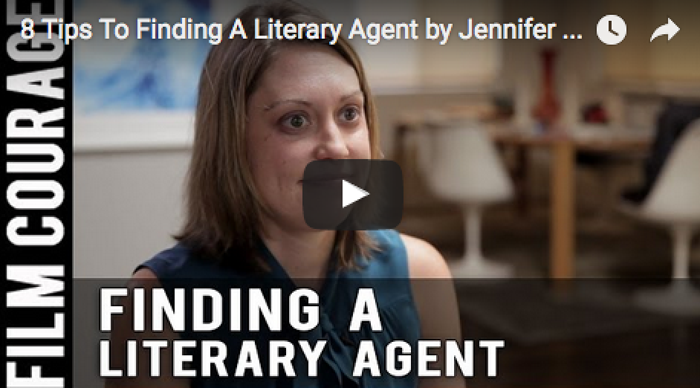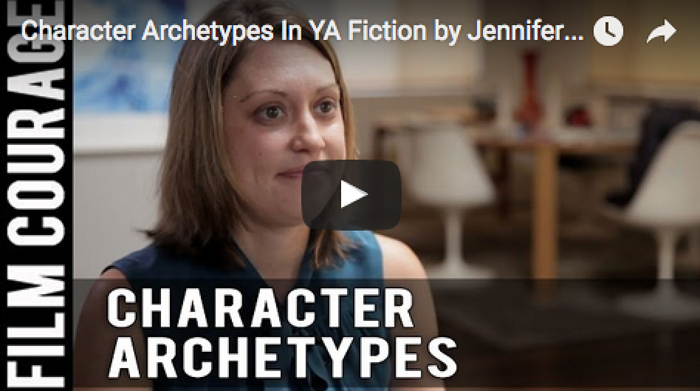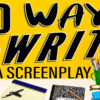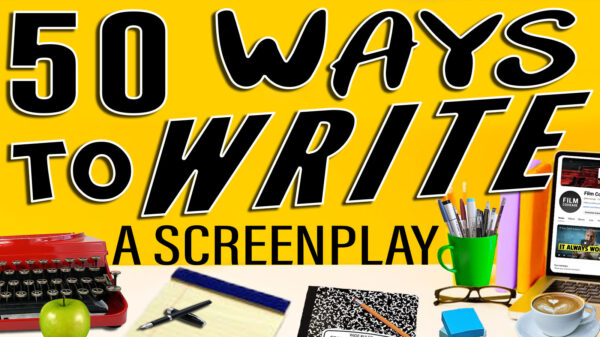
Watch the video interview on Youtube here
Film Courage: Let’s take the hypothetical author who has just written their first novel and now they’re looking for an agent. What steps should they take, how committed to that book should they be? How free should they be to say “Maybe this isn’t the one?”
Jennifer Brody: I mean I think it’s always worth…at the time you write your book, you’ll be so attached to it and so in love with it, it will be heartbreaking if you don’t get agented or if it doesn’t sell even though that’s really typical. My advice is once you start the querying process, is to start writing your next book so you have something else that you’re focused on and you know that it’s not the end of the road. Sometimes it might take an author several books before they find an agent. That’s not uncommon.
The things I really recommend are workshopping a lot, taking classes (I teach at the Writing Pad) which have a workshop component. Or I workshopped the book that I sold (The 13th Continuum) with Meg Wolitzer who is one of my favorite authors. I also workshopped with Victor LaValle who is another one of my favorite authors. And I would go to conferences and try to meet people and it really improved my writing.
For the querying process it really is finding the agents who you think are the best fit that are open to submissions and then really following their guidelines.
Writing a great query letter, spending a lot time getting that perfect and then publishing moves very slowly. So it can be months and months and months process of even just hearing back from one person.
And then once you’re going on submission, it can be months and months and months and months because they get inundated with so much material. So I think that the best way to handle it is to then also be working on something for yourself otherwise, if an agent comes back to you and says “Hey, I really like your book. But I’m not sure I can sell this but I’d love to see what you do next!” So then you can say “Hey, I’m going to be doing this next” and then you can come back to them.
“So the query letter really needs to be written well. And I also think ideally in a tone that really reflects your book, which is to say especially the synopsis. If your book is really kind of snappy and witty, then your synopsis probably should be somewhat in the same vein to convey that.”
Film Courage: So with the query letter, did you have a template that you found where you just kind of changed the names and dates?
Jennifer Brody: No…[laughs] not to that extent. There are a few good websites online that will show the format. So the format is something you really want to follow and stick to, although I don’t think you can really do just like changing things because a lot of it is like writing that really ‘hooky’ elevator pitch, making sure you have a great bio that is concise and descriptive because when they’re looking at a query letter, that is the first example of can you write well? So the query letter really needs to be written well. And I also think ideally in a tone that really reflects your book, which is to say especially the synopsis. If your book is really kind of snappy and witty, then your synopsis probably should be somewhat in the same vein to convey that.

Watch the video on Youtube here
And then in terms of personalizing it, I think it is really worth while when querying agents to personalize to them which is to show some knowledge about what books they represented, what types of genres they like (if you were a big fan). Like my agent had sold the Devil Wears Prada, which I absolutely loved. You know, let them know that you loved this book and that you’re coming to them because you know who they are. You know who their agency is…I think if you personalize. And even better if you have a personal connection or some way. Like you’ve been at a conference where they spoke even, it doesn’t even have to be that you knew them…just “I saw you at the X Panel at the AWP Conference and I was really impressed and I am coming to you.” So I think that those things really help a lot. It’s just like an editor friend of mine who used to work at Harper Collins. She told me in the beginning, “It’s like dating.” She’s like “You’re going to go on a lot of dates.” And I think that is really accurate because you really are looking for the right fit. Being unagented is actually better than being with a bad agent. And it doesn’t seem like that would be the case, but it actually is. Someone who isn’t a good fit for you, who isn’t doing your work justice can actually do more damage than just not having an agent. So I just think it’s very important to make sure that it is the right fit for your material and for you because they really need to be your cheerleader. They really are the person who is going to be helping you through the crazy process of trying to find a publisher. And ideally also someone who is in it for the long haul and will stay with you when your first book doesn’t sell because that’s so common, who is going to be there for your next book who will still represent you when you switch genres and come back and say “Hey, I’m writing YA Sci-Fi now…can we still do this?”
I was very lucky that my agent has stuck by me and has been amazing through this whole process. And she’s responsive. She responds to my emails right away. I know a lot of people will struggle with that sometimes. If your agent is not getting back to you, yeah…I think that’s a real problem. So I think it’s really important to find the right person.
Film Courage: Can you give some other hypotheticals (such as) how being sort of unagented might be better than being with the wrong pairing?

Watch the video interview on Youtube here
Jennifer Brody: Yeah. There are a bunch of different ways. I used to go and either meet with or speak with some pretty well-known authors they used to say things like “I’m so glad that my first book didn’t sell.” And it’s so hard to see that at the time. But I was hanging out with Andre Dubus III who wrote the House of Sand and Fog, which was a best selling book. He’s been on Oprah. And his dad was the biggest short story author ever. So the guy had connections. But I believe I asked him “The first book you ever sold, how many had you written?” And I think he said 3-4. It was quite a few. And this was a guy who had publishing connections and a writing degree and all those fancy things. And the thing about it when you’re first writing, you’re developing your craft and you get better. So a lot of times the first thing you write isn’t in the sweet spot of what you’re supposed to be writing. And a lot of times you will look back and be like “Wow! I really was undeveloped. It really was better that this was the stage where I sold a book. And being an author is a little different from some other creative professions. Because you don’t really age out of it to the same degree. I mean sure, publishing loves the young 22-year-old who has the hit book like Veronica Roth who wrote Divergent (Series). Yeah, they love that narrative but a lot of times authors are going to write their best work when they get older. 30, 40, 50, 60…I mean Frank McCourt who wrote Angela’s Ashes, I think he wrote that when he was about 50 or 60. That’s one of my favorite memoirs of all time. A lot of my favorite authors who are producing work are not young people…
Film Courage: Ursula Le Guin…
Jennifer Brody: Ursula K. Le Guin is amazing. I am obsessed with Stephen King. I think he’s a genius and I still read all of his books. And he’s still publishing a ton. I still read Anne Rice. But then there are other people. I know Philip Roth retired only recently. I mean he was writing books up until a couple years ago. And I think a lot times they are producing their best work. Like Cormac McCarthy is writing some of his best books within the last 10 years and he is not a young man. So I think that we develop over the course of our writing careers. I like to look at it as, I’d hope to write many, many, many books and I hope to get better as I do. So really kind of cultivating that.
Question for the Viewers: What is your experience in seeking a literary agent? Any insights you can share?
More videos with Jennifer Brody here on Youtube!
BUY THE BOOKS – THE 13TH CONTINUUM: The Continuum Trilogy, Book 1
RETURN OF THE CONTINUUMS: The Continuum Trilogy, Book 2
The United Continuums: The Continuum Trilogy, Book 3
CONNECT WITH JENNIFER BRODY
Jenniferbrody.com
Facebook
Twitter
@jendawnbrody on Instagram
Sign up for Jennifer’s mailing list here!
Advertisement

Watch Cold Love on Vimeo here
COLD LOVE – Cold Love highlights three expeditions spanning many years of Lonnie Dupre’s career — the first non-motorized circumnavigation of Greenland, the first summer expedition to the North Pole, and the first attempt of a solo January ascent of Denali. The film’s powerful footage reveals up-close the beauty and life-giving forces of these icy realms. And in seeing, we can’t help but be inspired to love and protect our earth’s frozen places. Not only are they beautiful and fragile, but they are the global engine that regulates the climate and provides a stable environment for all life on the planet.

See the late Alan Thicke in It’s Not My Fault and I Don’t Care Anyway on iTunes here
IT’S NOT MY FAULT AND I DON’T CARE ANYWAY – A rich and famous self-help guru’s controversial philosophy of extreme selfishness is put to the ultimate test when his only daughter is kidnapped and held for ransom (featuring the late Alan Thicke)

Watch Valley of Ditches on Vimeo here
VALLEY OF DITCHES – A young woman bound in the front seat of a parked car watches helpless as her captor methodically digs a grave in the desert ground. The bloody lifeless body of her boyfriend lies framed in the rear-view mirror, a fate she will fight at all costs to avoid for herself. But this is only the beginning of a brutal struggle where survival could be worse than death.

The Film Fund – check it out here!
From The Film Fund – Get up to $10,000 to make your short film by writing one sentence. The Film Fund is providing funding up to $10,000 for a short film in a way that’s a lot simpler than screenwriting contests, crowdfunding, or applying to grants – read more about Founder and CEO Thomas Verdi’s The Film Fund here via his website.

Visit LeftOnPurpose.com here to watch the film and read more on Mayer Vishner
LEFT ON PURPOSE – Midway through the filming of a documentary about his life as an anti war activist, Mayer Vishner declares that his time has passed and that his last political act will be to commit suicide— and he wants it all on camera. Now the director must decide whether to turn off his camera or use it to keep his friend alive. Left on Purpose is an award winning feature length documentary that confronts the growing issues of aging, isolation and end of life choices through an intense character driven story of the relationship between filmmaker and subject. With humor and heart it provides a rare cinematic look at what it means to be a friend to someone in pain.


























